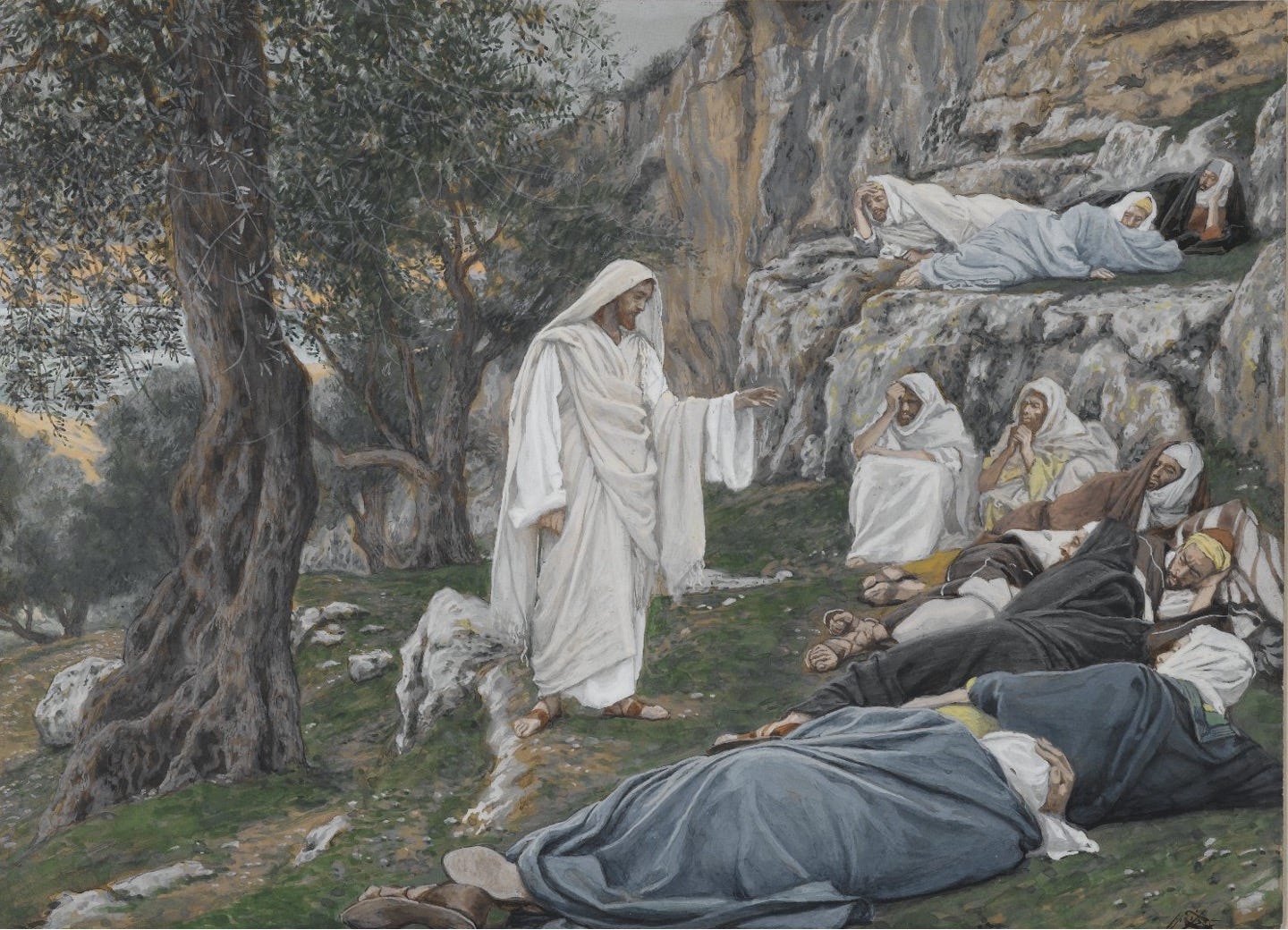In Mark 1, Jesus successfully launches his ministry in Galilee. But then after a series of conflicts in Mark 2 and 3, Jesus is rejected by the religious and political establishment in Galilee. We know this because in Mark 3:6 we read that the Pharisees, a prominent religious group, and the Herodians, supporters of King Herod, ruler of Galilee, (two groups who would usually have nothing to do with one another) came together to look for a way to kill Jesus.
Yet even as Jesus is being rejected by those in power, Jesus’s popularity continues to grow, with crowds of people coming from all over the region to see and hear him. (3:7-8)
In response to all of this…
“Jesus went up on a mountainside and called to him those he wanted, and they came to him. He appointed twelve that they might be with him and that he might send them out to preach and to have authority to drive out demons.” (Mark 3:13–15, NIV)
In the Hebrew scriptures all kinds of interesting and important things happen on mountains. Commands are given, covenants are made, and communities are formed on mountains. Here Jesus goes to the mountain to form a new community.
By choosing twelve, not seven or ten, but twelve, as in the twelve tribes of Israel, Jesus is declaring his intention to restore Israel. This symbolic action is another way to communicate the purpose of his ministry.
He didn't come to just tell perplexing stories or walk around and heal a few fortunate people or to irritate the religious leaders.
He came to kick off what the prophets described as the restoration of all things, which begins with the restoration of Israel, God's' chosen people.
This symbolic action solidifies the break with the religious and political establishment that is now looking for a way to kill him.
What Jesus does here is subversive and revolutionary.
It's also deeply strategic.
As he faces the threat of death on one side and growing popularity on the other, Jesus needs to multiply himself so his ministry can expand and continue in his absence.
The calling of the twelve is more than symbolic, because Jesus also give them a job description.
They're going to be with Jesus. They're going to have special access to him. They are insiders with backstage passes.
As they learn from him, he's going to send them out to preach and to cast out demons. In the original language the word translated as send out is from where we get the word apostle . An apostle is one who is sent out for a special purpose.
Their special purpose is to continue doing what they have witnessed Jesus doing: preaching the good news and taking on the forces of evil.
In 3:16-19, Mark lists the twelve whom Jesus chooses to represent him as his apostles (sent ones):
Simon, whom Jesus nicknames Peter, which means rock or stone. Probably because he's the leader or the cornerstone of the new community. Or maybe because Simon the Rock sinks like one.
James and John, whom Jesus calls the Sons of Thunder, a possible reference to their hot-tempers. (One time, when a village doesn't welcome Jesus they ask if they can call down fire from heaven. Another time they send a cease and desist letter to someone who is successfully casting out demons in the name of Jesus, without being an official member of their group. They will not tolerate trademark infringement.)
Then there's a group of relative unknowns: Andrew, Philip, Bartholomew, Thomas, James (son of Alphaeus), Thaddaeus, Simon the Zealot, which means he could have been part of violent revolutionary group hoping to overthrow the Roman government.
Matthew, AKA as Levi, the tax collector, whom Jesus recruited back in Mark 2.
And Judas Iscariot. Iscariot could be a reference to his being a member of the Sacarii, literally the dagger men, a group of Jewish assassins who used curved daggers to stab aristocrats in crowds.1 He's also identified as the one who will later on betray and hand over Jesus to the authorities in Jerusalem.
This group forms the nucleus of the early church, the first community of Christ-followers.
There is a theory in church leadership that says a congregation's DNA is shaped by the personality and character of its founding members. If true, then the twelve shaped the DNA of the first Christian community.
With this in mind, what can we say about this group?
They were a bunch of nobodies. They didn't come from influential families. They weren't powerful. They weren't scholars. They weren't on anybody's most likely to succeed list. Jesus plucked them from obscurity.
They were also a radically, maybe even dangerously, diverse group.
Matthew was tax-collector by the lake. He taxed fishermen. At least four of these guys were fishermen, two of whom were hot heads. How much do you think they enjoyed spending time together?
If Simon was a Zealot, committed to kicking the Romans out of the Holy Land, and if Judas was a dagger man trained to assassinate government officials, how do you think they felt about someone who collected taxes for the government they opposed? Do you think maybe Mathew slept with one eye open the first few weeks they were together?
They were also an egocentric group, always jockeying for positions of power and prestige.
Peter liked to tell everyone, including Jesus, what to do. James and John thought they were better than the others, deserving seats at the right and left hand of Jesus.
The only thing holding this group together was their loyalty to Jesus and even that was limited. By the end of the story, as Jesus is dying on the cross, we can describe all of these founding members as failures who either deserted, denied, or betrayed the one who initially called and drew them together.
Are these failures the best Jesus could do? Is this really Jesus's vision of an ideal church? Is this the kind of founding DNA he wants to imbed in his movement.
One argument from skeptics who reject the historical reliability of the gospels is that Jesus's disciples exaggerated his deeds, fabricated his teachings, and invented the resurrection as part of a conspiracy to take over the world.
One counter argument is that if the disciples made up these stories, would they have really described themselves in such unflattering ways? Rather than portraying themselves as a bunch of mumbling, bumbling, fumbling nobodies who failed Jesus when he needed them most, isn't it more likely they would have made themselves out to be a bit more heroic?
Why didn't they delete Judas's name from the record? This dagger man who stabbed Jesus in back was with them the whole time and they didn't see him for who he really was? Yet they don't clean up this part of the story.
Church tradition says that Mark wrote down the stories he heard Peter tell about Jesus. If the Gospel of Mark is actually the gospel according to Peter, why would Peter reveal himself to be such a coward after Jesus is arrested, unless it was the truth and conveyed an essential component of the gospel story,
The calling of these first disciples speaks a word of hope to those of us who come after them. From the beginning Jesus has gathered around himself a rag tag band of unpredictable, unreliable, self-absorbed, power hungry, politically confused sinners to represent him in the world.
Over the past 2000 years, Jesus hasn't changed his strategy.
I don't how we can read the gospels and see the kind of people Jesus chose to be with and represent him and feel like we need to pretend to be better or smarter or more put together than we really are. It's like we think that by enhancing our image, emphasizing our strengths, hiding our weaknesses, and erasing our failures from the public record we're somehow making Jesus look better.
What makes Jesus look good, what reveals the genius of Jesus's strategy, what puts the redeeming and transforming power of the gospel on display is the way keeps using broken, imperfect people to make a difference in the world. Yes, it means there are some embarrassing and dark parts of the story we'd all like to delete, but the gospel is bigger and brighter than the darkest parts of the story.
I love these lyrics from Leonard Cohen:
Forget your perfect offering.
There is a crack in everything.
That's how the light gets in.
When I look at those Jesus gathers around himself, and when I look in the mirror, you know what i see? I see cracks, which means I also see gospel, because that's how the light gets in.
This is only one possible meaning of Iscariot, but it’s the most preachable, so I’m going with it!





These are profound thoughts, Wade. Thanks for saying what I need to hear...AGAIN!